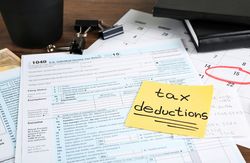What You Need to Know About Reporting Bad Debts to the IRS

When it comes to managing a business, one of the most critical components to maintain your bottom line is debt collection. Recovering monies owed for services or products is how your enterprise earns a profit, and gathering these payments quickly ensures accurate booking and reporting. As such, if you incur a bad debt, you may be wondering how that will affect your submissions to the IRS. To better understand how the two are connected, consult the guide below.
What Happens if You Don’t Report a Bad Debt?
 Most business owners count a transaction as revenue once the sale is made—not when they’ve completed debt collection. As a result, when bills are left outstanding, business owners actually end up spending more money on income taxes. Because of this, you can report any outstanding debts to the IRS as a deduction through Form 1040, Schedule C, Profit or Loss from Business (Sole Proprietorship). This can be a bit complicated, as you’ll need to prove that it was your intention to collect money for any services or products provided at the time of the transaction.
Most business owners count a transaction as revenue once the sale is made—not when they’ve completed debt collection. As a result, when bills are left outstanding, business owners actually end up spending more money on income taxes. Because of this, you can report any outstanding debts to the IRS as a deduction through Form 1040, Schedule C, Profit or Loss from Business (Sole Proprietorship). This can be a bit complicated, as you’ll need to prove that it was your intention to collect money for any services or products provided at the time of the transaction.
What Should You Do Once the Debt Is Paid?
If you recover the bad debt after it’s already been submitted to the IRS as a deduction, you’ll need to claim the money you received in the following year. You will also need to include whatever amount you deducted initially.
The best way to avoid the complications of bad debts is to have a handle on your debt collection from the start. That’s where the team at Joseph, Mann & Creed can help. Based in Twinsburg, OH, this agency has close to 20 years of experience, and they will utilize their knowledge to ensure your bottom line stays safe. Visit their website to learn more about their debt collection services, and call (216) 831-5626 to schedule an appointment with a representative today.
About the Business
Have a question? Ask the experts!
Send your question

